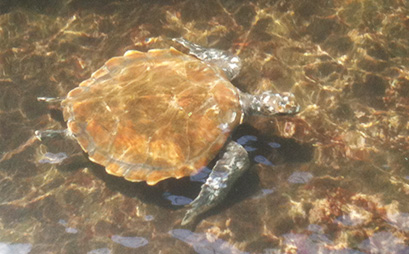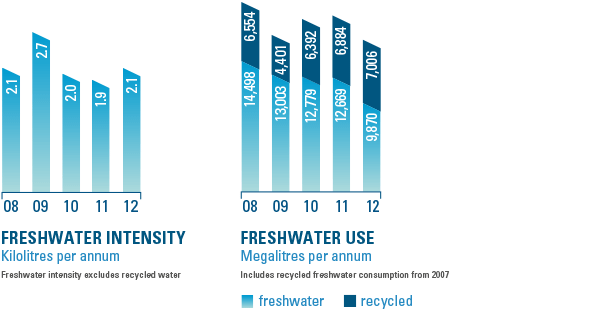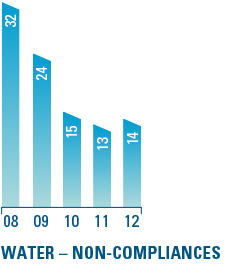For many communities (including some in which we operate), shortage of drinking water is a significant, long term issue. BlueScope has reduced dam water use so that our operations do not draw on community water supplies.
To continue to achieve this, the Company requires that water efficiency is considered during the design of new facilities. It also means that existing operations investigate water efficiency opportunities and explore alternate sources such as recycled water. A range of successful water savings initiatives at BlueScope have already been undertaken to reduce water consumption and reliance on community supplies.
Process disturbances have the potential to lead to emissions to water. BlueScope has been reducing the number of process disturbances leading to emissions to water, as well as the extent of emissions when process disturbances do occur. The Company aspires to extend this record of improvement and to eliminate all emissions to water from process disturbances.
Many of BlueScope's operations are located adjacent to significant water bodies. These water bodies are not only used by humans for domestic, recreational and industrial purposes, but are home to a myriad of flora and fauna.
BlueScope has been an active participant in a collaborative and scientific assessment of the health of the Port Kembla harbour during the past 12 months. Significant improvements in marine life in the harbour have occurred over the past decade. The Company, the broader community and neighbouring industry continue to focus on reducing emissions to the harbour.

BlueScope aims to reduce all types of emissions to water and works with the local communities and regulators on improving water quality.
Current controls
The Company monitors water consumption and emissions to identify performance improvement opportunities, understand community impact, and maintain regulatory compliance. Significant reductions in water consumption have been achieved in areas where water shortages are an ongoing issue. Although the iron and steel manufacturing process is unavoidably water intensive, BlueScope has identified and applied water recycling programs in parallel with water savings initiatives to reduce fresh water use.
A variety of control mechanisms to reduce water emissions have been installed throughout BlueScope's operational facilities. The Company operates a multitude of water treatment plants so that discharge water does not have an adverse effect on the environment. It also monitors and studies the steel manufacturing processes to maintain quality and minimise disruptions so water treatment plants can operate effectively and continuously.
An example of this can be seen at our Kapar facility in Malaysia which has metal coating and painting lines. Waste water is treated and monitored in the waste water treatment plant, before being discharged into a local waterway. To demonstrate the quality of the effluent water, a fish tank using discharge water has been installed in a prominent location on site.
Performance
BlueScope monitors overall freshwater intensity, total freshwater usage and percentage recycled freshwater water usage. All have been significantly affected by the restructuring of the Company's Australian operations in FY2012.
While significant improvements in intensity have been made in recent years, the FY2012 results reflect the significant changes in plant configuration at Port Kembla Steelworks and, as a result, in economies of scale. Equally, as a direct result of the reduced production, BlueScope’s freshwater consumption has fallen significantly, with an overall reduction in use of 2,677 Mega-litres (~14%). We have managed these changes such that the percentage of recycled water contributing to the total water demand has continued to increase, reaching a new record level of 41.5% in FY2012.
At our largest steelmaking facility, Port Kembla Steelworks in New South Wales, Australia, most water used is seawater, displacing the need to use precious fresh water for much of the site's cooling requirements. Since FY2007, the steelworks has also been using recycled water supplied by Sydney Water. Waste water received by Sydney Water from across the Illawarra region is treated and then re-used at the Steelworks. The use of recycled water has saved more than 35 billion litres of fresh water to date.
Western Port's Victorian operations have similarly commenced using recycled water to reduce dam water consumption through an agreement with South East Water.

The number of non-compliances relating to water has reduced by more than 50 per cent over the last five years.
Fines & Prosecution

Since the incident reported in May 2011, and reported in last year’s Community, Safety, Environment report, there have been no additional prosecutions or fines issued associated with water quality issues from our operations.
